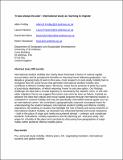‘It was always the plan’ : international study as ‘learning to migrate’
Abstract
International student mobility has mainly been theorised in terms of cultural capital accumulation and its prospective benefits on returning home following graduation. Yet, despite a growing body of work in this area, most research on post-study mobility fails to recognise that the social forces that generate international student mobility also contribute to lifetime mobility plans. Moreover, these forces produce at least four types of post-study destination, of which returning ‘home’ is only one option. Our findings challenge the idea that a circular trajectory is necessarily the ‘desired’ norm. In line with wider migration theory, we suggest that return may even be seen as failure. Instead we advance the idea that cultural and social capital acquired through international studies is cultivated for onward mobility and may be specifically channelled towards goals such as an international career. We contribute a geographically nuanced conceptual frame for understanding the relation between international student mobility and lifetime mobility aspirations. By building on studies that highlight the role of family and social networks in international student mobility, we illustrate how influential familial and social institutions – both in the place of origin and newly encountered abroad – underpin and complicate students’ motivations, mobility aspirations and life planning pre- and post-study. We argue for a fluidity of life plans and conclude by discussing how geographies of origin matter within students’ lifetime mobility plans.
Citation
Findlay , A , Prazeres , L , McCollum , D & Packwood , H 2017 , ' ‘It was always the plan’ : international study as ‘learning to migrate’ ' , Area , vol. 49 , no. 2 , pp. 192-199 . https://doi.org/10.1111/area.12315
Publication
Area
Status
Peer reviewed
ISSN
0004-0894Type
Journal article
Collections
Items in the St Andrews Research Repository are protected by copyright, with all rights reserved, unless otherwise indicated.

